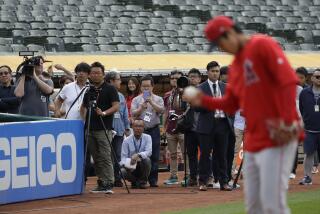Two Views From Abroad on Campaign ’92 Focus on Status Quo,Survival : Japan: There’s sentiment for ‘the devil you know,’ but the less-known man is acceptable.
- Share via
The Japanese are, as usual, fascinated with the U.S. election. This year’s race, indeed, is much more fun to watch than the elections of ’88 and ’84. The noisy histrionic behavior of a little Texas billionaire has been pure entertainment, not just for Americans but also for the Japanese.
Japanese business people are mostly on the side of George Bush. This has nothing to do with whether they personally like Bush. The patrician dignity of George Bush was intolerably undermined when he vomited at the Tokyo dinner party. But business people--not just in Japan but also in Europe, Canada and Latin America--are almost instinctively pro-Republican. They are suspicious of the Democrats, believing they are scheming to turn capitalist America into an over-regulated socialist welfare state. That’s not an America they want to do business with.
Japanese officials are also pro-Bush because they always prefer the incumbent. In 1980, when Jimmy Carter was President, they supported Carter. But in 1984, they preferred Ronald Reagan over Walter Mondale. Japanese officials want to deal with a devil they know rather than a devil they don’t.
Besides, Bush is capable of using military power. Could Bill Clinton do that? The world, even after the Cold War, remains a nasty place. Perhaps various republics of the former Soviet Union will begin a bloody civil war. The not-so-civilized Iranians or North Koreans may soon get nuclear warheads on their Scuds. How will Clinton handle that? Cautious Japanese officials are much more comfortable with the proven Bush.
What side are Japanese journalists and intellectuals on? They tend to think, cautiously, that perhaps Clinton would make a better President. Because of the various charges against Clinton (the image of philandering, pot-non-inhaling, draft-dodging slick Willie has been dutifully reported in the Japanese media), there has been certain uneasiness about his character even among the Japanese intelligentsia. But many of Clinton’s proposals--like improving the educational system, encouraging cooperation between government and business, rebuilding infrastructure, creating a comprehensive health insurance system--actually make a lot of sense from the Japanese viewpoint. Clinton seems to be more interested than Bush in improving conditions of ordinary American people.
There is one problem with Clintonomics, as many Japanese economists have already pointed out; his numbers. Clinton budget numbers (like those of Bush) are simply unreal. While Clinton’s economic policy is good and enlightened, his numbers are wrong. Perhaps a President Clinton would grapple with the budget deficit only after his reelection of 1996.
Since both Bush and Clinton are basically moderate and consensus-seeking, the Japanese are not overly concerned with the results. They can work with either. Had the choice been between Jerry Brown and Pat Buchanan, the election would have scared the hell out of the Japanese.
More to Read
Get the L.A. Times Politics newsletter
Deeply reported insights into legislation, politics and policy from Sacramento, Washington and beyond. In your inbox twice per week.
You may occasionally receive promotional content from the Los Angeles Times.










